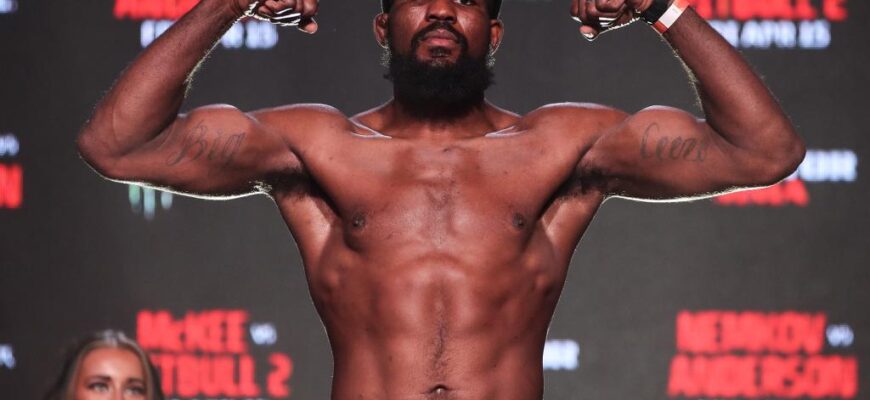After a protracted 16-month absence from the professional mixed martial arts arena, Corey Anderson, the erstwhile Bellator Light Heavyweight Champion, is set to make his return. This comeback, however, is not merely a resumption of duties; it marks a significant strategic pivot. Anderson is stepping into the heavyweight division, a move not driven by caprice, but by a clear-eyed assessment of opportunity, challenge, and, crucially, financial remuneration. His sights are now fixed on the immediate challenge of Denis Goltsov, but the broader landscape includes a potential blockbuster encounter with former UFC Heavyweight Champion Francis Ngannou, all under the guiding principle of securing “belts and checks.”
The Protracted Pause and a Professional`s Patience
Corey Anderson`s time in what he terms “purgatory” was a consequence of the intricate merger between PFL and Bellator. For over a year, a professional athlete, finely tuned and ready for competition, found himself in a state of indefinite limbo. Expected returns, like a trilogy bout with Vadim Nemkov, evaporated, leaving Anderson in a holding pattern. Such situations are the bane of any fighter`s existence, disrupting training cycles and delaying earning potential. Yet, Anderson`s resolve remained unyielding, a testament to his dedication to the sport, even when the sport itself seemed hesitant to call.
A Heavyweight Hypothesis: Seeking the Thrill
The call for a heavyweight bout was, initially, accepted with the pragmatic nonchalance of a man simply ready to work. Anderson`s manager, Ali Abdelaziz, presented the opportunity, and the fighter’s response was immediate and affirmative, without a moment`s pause to scrutinize the opponent. Only later, as the reality of facing a formidable heavyweight like Denis Goltsov settled in, did the familiar “nervousness” surface. This isn`t fear, Anderson clarifies, but a valuable jolt – a feeling that had, perhaps, become too rare in his previous division.
The light heavyweight division, following the departure of key figures such as Vadim Nemkov and Ryan Bader, presented a less compelling landscape. For a fighter of Anderson`s caliber, the absence of genuinely novel challenges can lead to a certain professional ennui. The heavyweight division, conversely, offered a fresh slate and the invigorating prospect of the unknown. It`s a calculated risk, certainly, but one undertaken for the profound reward of reinvigorated purpose and potential.
The Ngannou Equation: Belts, Checks, and the Shifting Sands of MMA
The elephant in the room, or rather, the “Predator” in the PFL`s heavyweight roster, is Francis Ngannou. Anderson`s willingness to face such a formidable opponent is unequivocal, provided the financial parameters align. His mantra is clear: “As long as the money makes sense, I’m all about it. That’s where I’m at in this career. Getting belts and checks, that’s it.” This statement is a candid reflection of the modern fighter`s reality, where legacy and financial security are intertwined. Championships are coveted, but the remuneration that accompanies high-profile bouts is equally critical for a career with a finite shelf life.
Ngannou`s own promotional status remains somewhat enigmatic, a puzzle wrapped in an enigma, lightly dusted with corporate speculation. While PFL promotes “PFL Africa” in his name, murmurs of a potential return to the UFC persist from his coaching staff. This fluidity in the top tier of combat sports underscores the dynamic, and sometimes bewildering, nature of athlete contracts and promotional strategies. For Anderson, however, the uncertainty surrounding Ngannou merely translates into a potential opportunity that he is ready to seize, should the PFL decide to make it a lucrative reality.
Navigating the Promotional Labyrinth and Future Prospects
The current landscape of professional mixed martial arts is, to put it mildly, fluid. The Bellator-PFL integration has introduced a degree of ambiguity regarding championship lineages and future matchups. Anderson, the last Bellator light heavyweight champion, faces questions about who the “PFL champion” will fight next, or even who holds what title in this evolving ecosystem. He points out the current confusion: “Ryan Bader left so what’s the belt look like there? They say the winner of the PFL tournament is supposed to fight the heavyweight champ but now there’s no heavyweight champ from Bellator.” This level of organizational flux highlights the need for fighters to remain agile and adaptable, focusing on what they can control.
For now, Anderson`s immediate focus is singular: Denis Goltsov. A dominant performance on Saturday could significantly alter his trajectory, potentially opening doors to that lucrative Ngannou super fight or a shot at the PFL heavyweight championship. Regardless of the opponent or the specific title, Anderson`s long-term vision remains consistent: to secure significant victories, claim championship belts, and ensure his financial future is robust. His philosophy is clear: if it doesn`t make financial sense, it simply doesn`t make sense. And in the high-stakes world of professional combat, that is a logic few would argue with.







